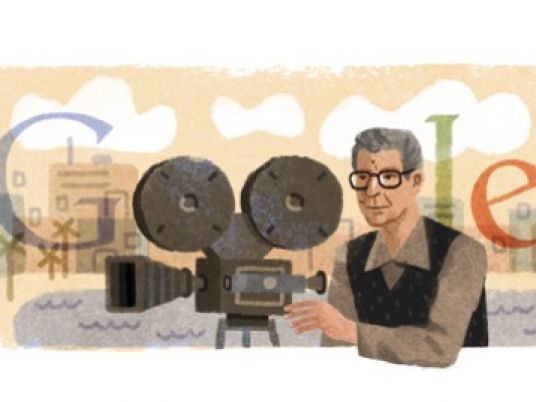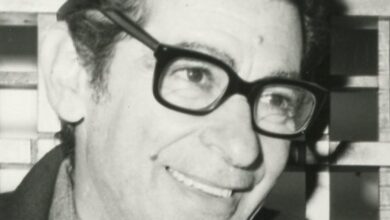
“Skoot…hanswar” (Silence…we will shoot) and “al-cimena…dana amoot men gherha” (Cinema…I die without it). These are the two most famous quotes of one of the greatest and innovative Egyptian filmmakers of all time Youssef Chahine.
Google has paid homage to the Egyptian director Chahine with a doodle on its homepage in celebration of the 89th anniversary of his birth.
Born in 1926 in Alexandria, Chahine’s cosmopolitan homeland at the time played a great influence on his character mirrored in his decades-long, controversial career.
He came from a middle-class family with foreign roots; his attorney father had Lebanese origins while his mother was of Greek heritage.
Theatre and performing arts were his early-teenage obsession, which with years of studying and practice under his belt during 1940s in America, had become his expert realm.
Chahine embarked his unique, cinematic journey to ‘the Hollywood of the Middle East’ in 1950 with his film “Baba Amin” (Father Amin) followed by “Ibn al-Nil” (The Nile’s Son), which soon landed in the 1951 Cannes Film Festival's nominations and was highly-acclaimed by audience and critics alike.
His reputation as one of the Arab world’s most promising filmmakers was stamped with the release of “Bab al-Hadid” (Central Station), nominated for Golden Bear from Berlin International Film Festival in 1958.
Over the following three decades, his career embraced a myriad of distinguished film genres from musicals and comedies to neorealist dramas, historical epics and documentary.
Chahine’s autobiographical remarkable works introduced dramatic advances to self-portrayal field in the Arab world cinema in which he magically knitted the threads of personal experience details together with fictive elements.
In 1979, his autobiographical saga kicked off with “Iskindria…Leih?” (Alexandria…Why?), winning the Silver Bear from the Berlin International Film Festival.
Khaled Youssef, Chahine’s longtime disciple, helped in putting the 2008 “Heya Fawda” (Chaos) in its final form since his mentor’s health condition suffered a severe deterioration at the time.
The film reveals the deeply-rooted corruption in the Egyptian police force embodied by a sadistic low ranking police man who enjoys practicing human rights abuses including brutality, torture and even rape.
“Heya Fawda” was Chahine’s 45th and last film, predicting the outbreak of a revolution against Egypt’s authoritarian, repressive regime.
Chahine was also perceived as a great scriptwriter for most of his outstanding works winning a special Lifetime Achievement Award from the prestigious Cannes Film festival in 1997.
The auteur’s long career had always sparked controversy whether for explicit reference to bisexuality or religious concerns. For example, “Al-Mohagar” (The Immigrant) drew a lot of criticism as the storyline strongly depicts the biblical tale of Prophet Joseph.
In 2008, the grand master of Arab cinema died at the age of 82 due to a brain hemorrhage after spending several weeks in coma.
Upon learning his death, French President Nicolas Sarkozy paid tribute to Egyptian filmmaker Chachin describing him as “independent intellectual who advocated the merging of cultures…and one who his entire life used pictures in the battle against censorship, fanaticism and extremism."
In 2006, France granted Chahine the rank of 'officer' in its Committee of Honour.




